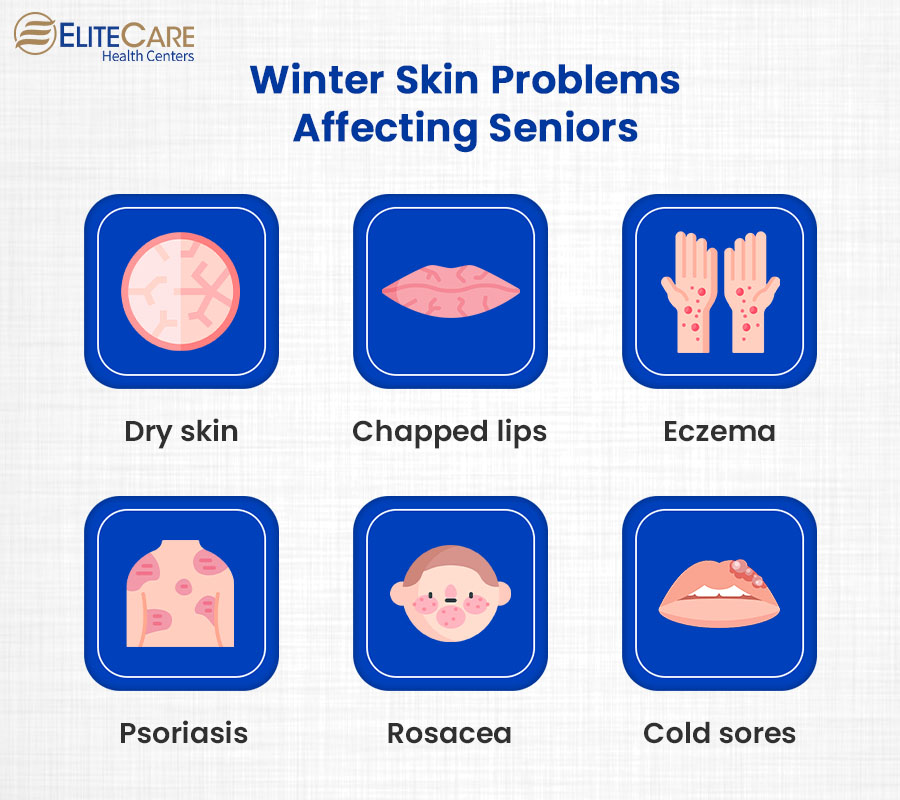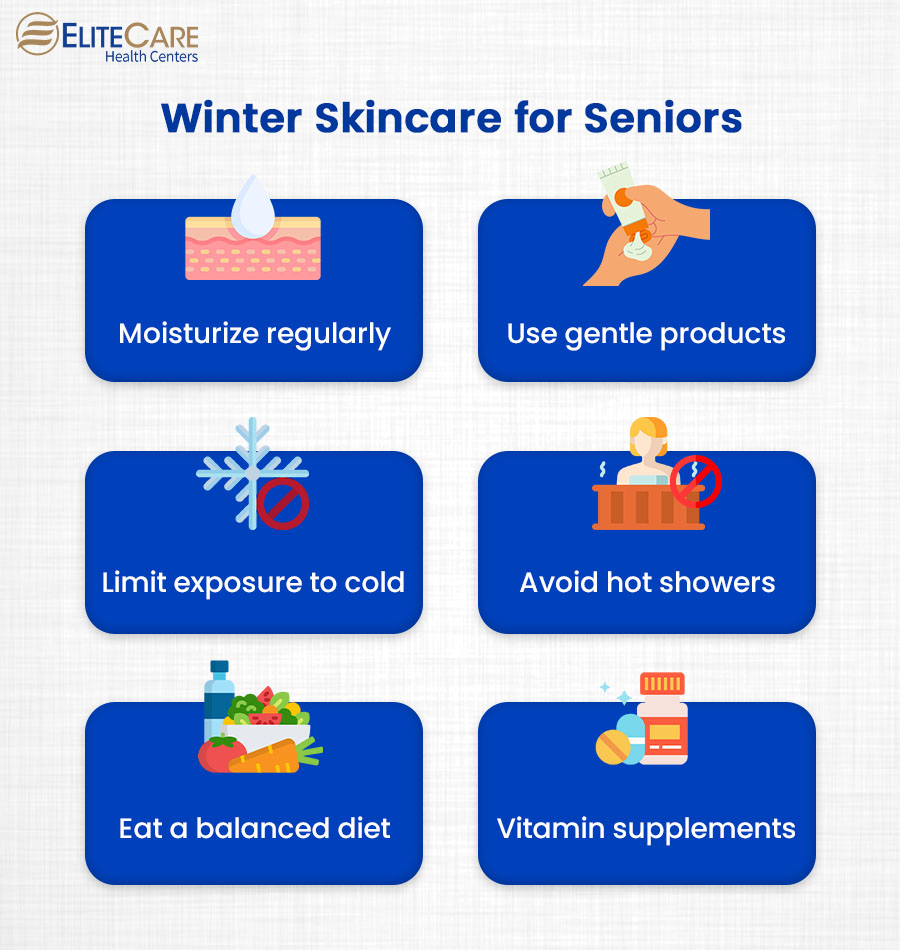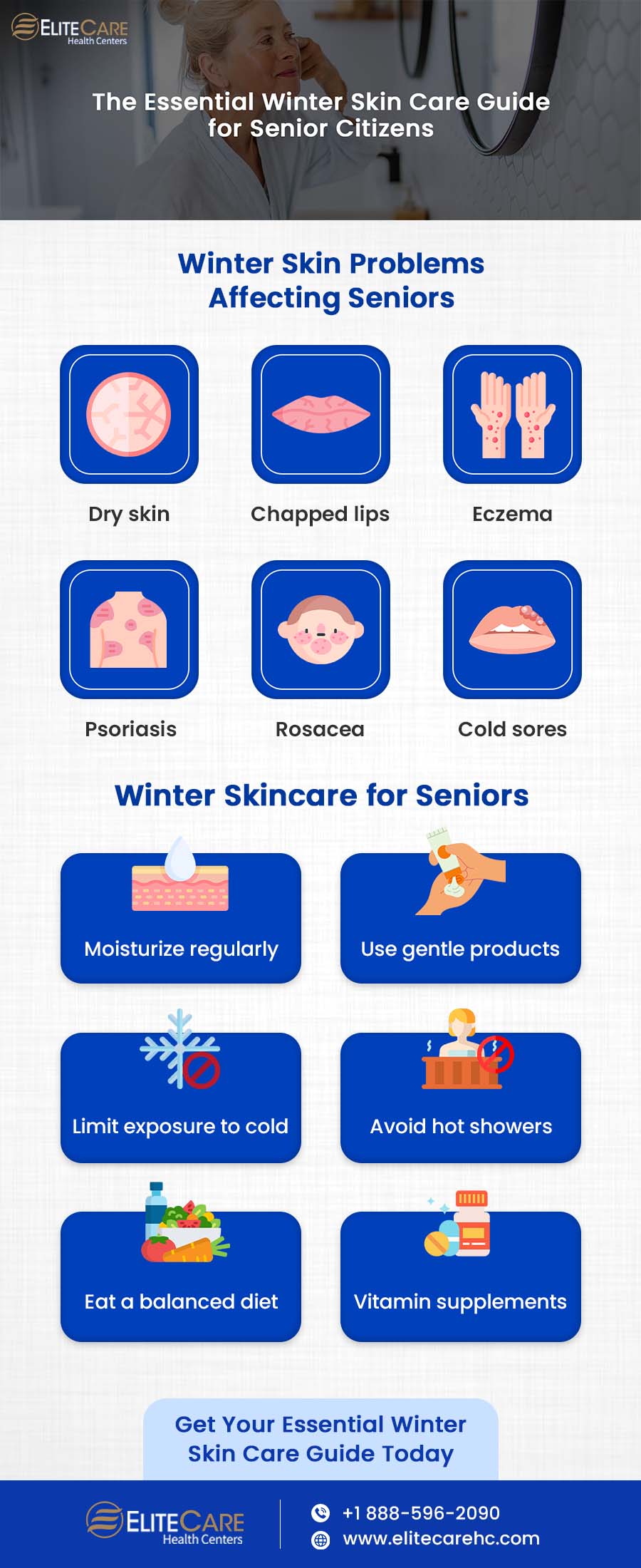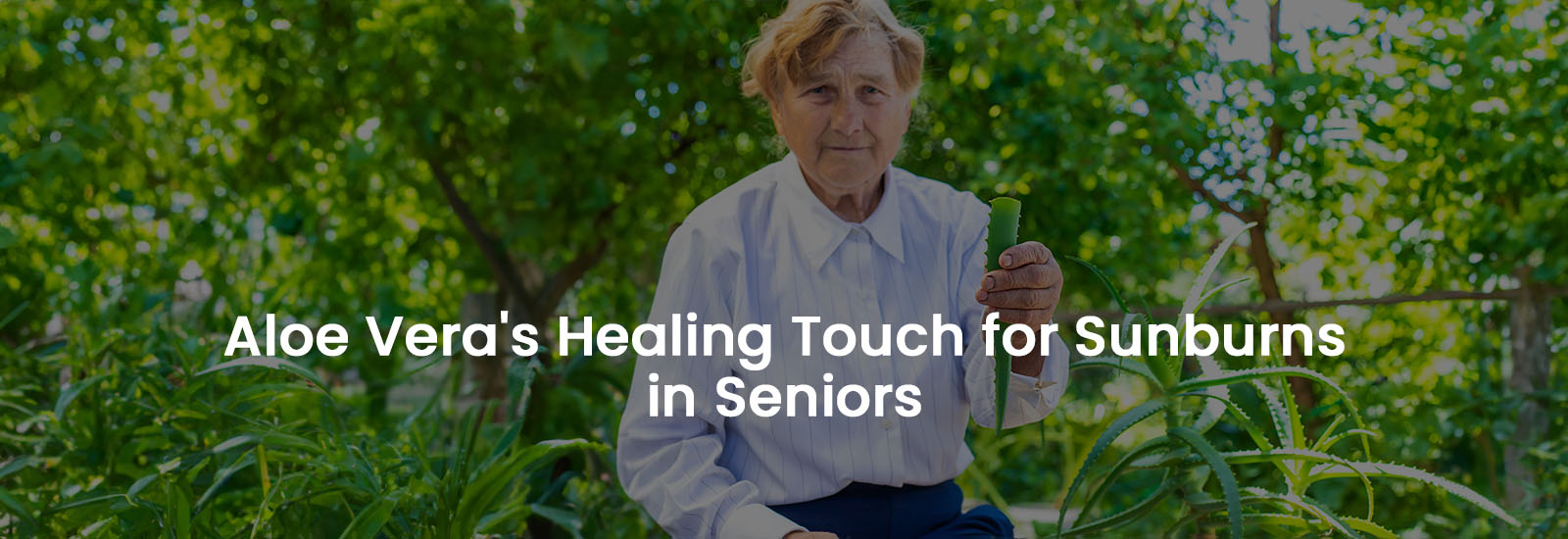
Aging is a natural process that affects us all, and it takes a toll on physical health in various ways. As we grow older, our skin becomes thinner, drier, and less elastic, making it more susceptible to wrinkles, fine lines, and other signs of aging. Despite this, many seniors still value having a good complexion and want to maintain healthy, youthful-looking skin. With its severe conditions, winter weather can be tough on seniors’ skin, as the cold temperature, low humidity levels and harsh winds can strip away the natural oils from the skin, leaving it dry and itchy.
Whether you’re a senior citizen looking for skin care tips during the winter or a loved one looking to guide a senior, this guide will provide all the information you need to help keep their skin soft, smooth and healthy.
Common skin issues faced by seniors in winter

1. Dry skin
This a common problem during winter months. The skin is exposed to cold temperatures. The dry air sucks the moisture from the skin, leaving it dry.
2. Chapped lips
One of the most delicate areas of the skin are lips. In winters they are prone to dryness, chapping, and cracking in winter. The extreme dryness can cause the skin to become dry and cracked, leading to pain and discomfort.
3. Eczema
Also known as atopic dermatitis, is a skin condition that causes dry, itchy, and inflamed skin. It typically begins in childhood, but can develop at any age. The root cause of eczema is not known, but it is believed to be a result of a combination of genetic and environmental factors. During the winter months, the cold air can further dry out the skin, causing eczema symptoms to worsen. These flare-ups can be uncomfortable and even painful, leading to low self-esteem and embarrassment in seniors. Additionally, winter’s short, dark, and gloomy days can also cause stress, further aggravating eczema symptoms.
4. Psoriasis
It is a chronic autoimmune skin condition that causes red, scaly patches to develop on the skin. The patches can be irritating and, in some instances, may cause agony. Winter weather is a common irritant that can trigger psoriasis outbreaks which are characterized by dry and fissured skin, exacerbating the already existing soreness and discomfort.
5. Rosacea
Cold temperatures and harsh winds can cause skin irritation and trigger flare-ups, leading to redness, flushing, and bumps on the face. The skin may also feel tight and uncomfortable, making it difficult for seniors to carry out their daily activities.
6. Cold sores
Cold sores can be problematic for seniors during winter months as they are painful blisters that can form around the lips and mouth. Winter weather can trigger outbreaks of cold sores, causing discomfort and embarrassment.
To prevent these skin issues, seniors need to keep their skin hydrated and protected from the harsh winter weather. Hydration is one of the most critical aspects of skincare, especially in the winter. Adequate hydration helps keep the skin plump and supple, reducing the appearance of fine lines and wrinkles. It also helps to improve skin elasticity and reduce the risk of skin problems such as eczema and psoriasis. However, it’s important to note that hydration alone is not a cure for psoriasis or eczema, and these conditions require medical intervention and treatment.
Read More: 7 Drinks to Keep the Elderly Hydrated
Winter skincare tips for seniors

1. Moisturize regularly
Moisturizing regularly is one of the essential winter skincare tips for seniors. It helps to restore the skin’s natural moisture balance, preventing dryness and discomfort. Seniors need to choose a moisturizer specifically designed for winter weather and apply it frequently throughout the day. A good winter moisturizer should contain ingredients that lock in moisture, such as glycerin, hyaluronic acid, or urea. It should also be non-irritating and free of harsh chemicals.
2. Use gentle products
Seniors’ skin is often more sensitive and prone to irritation, so it is important to choose skincare products that are gentle and free of harsh chemicals. Seniors should look for products labeled “gentle” or “for sensitive skin” and choose fragrance-free products, as fragrances can cause skin irritation and allergic reactions. It is good to avoid products that contain alcohol, as they can be drying and damaging to the skin.
3. Protect skin from cold weather
To protect the skin from the cold weather, seniors can follow the following tips:
- Wear protective clothing such as gloves, hats, scarves, and warm jackets. Opt for natural fibers such as wool or cotton, as synthetic fibers can irritate the skin.
- Seniors should limit exposure to cold air as much as possible. If they need to be outside for an extended period, they should try to find shelter from the wind or take breaks in a warm, sheltered area.
- The dry, indoor air of winter can also damage the skin. A humidifier can help keep the air moist and prevent the skin from becoming dry and itchy.
4. Avoid hot showers and baths
Hot water bathing during chilly days can strip the skin of its natural oils, leaving it dry and prone to itching and irritation. This can be particularly problematic for seniors, who may already have dry skin due to aging. In addition, hot water can also dilate blood vessels, causing redness and irritation, especially in those with sensitive skin or skin conditions like eczema or rosacea. The heat can also weaken the skin’s natural barrier, making it more susceptible to infection and other skin problems. Instead of hot showers and baths, seniors should opt for warm or lukewarm water showers, which will be gentler on the skin.
5. Eat a balanced diet
A healthy diet is essential to maintain overall health and protect the skin from the damaging effects of winter weather. A balanced diet should include a variety of foods, such as fruits, vegetables, whole grains, lean proteins, and healthy fats. These foods provide the body with essential vitamins, minerals, and antioxidants that help support skin health and prevent aging.
6. Take vitamin supplements
In addition to eating a balanced diet, seniors may also benefit from taking vitamin supplements. Vitamins such as Vitamin C, Vitamin E, and Vitamin A can be especially beneficial for skin health. These vitamins help to boost the immune system, protect the skin from free radical damage, and support the skin’s natural healing process. However, vitamin supplements should only be taken under the guidance of a provider.
Prevention is Key
Preventing skin problems from occurring in the first place is the best approach to maintaining healthy skin. This can be achieved by combining regular moisturizing, wearing protective clothing, and avoiding harsh skincare products.
Visiting a dermatologist on a regular basis can help seniors identify and treat any skin problems that may arise during the winter months. A dermatologist can also provide personalized skincare advice and recommend products specifically designed for aging skin.
Staying active is also essential for maintaining overall health and preventing skin problems during winter. Regular exercise can help to improve circulation and boost the immune system while drinking plenty of water can help to hydrate the skin and flush out toxins.
Read More: Can seniors do strength training exercises?
Take Away
It’s important for seniors to take good care of themselves and their skin. Investing in anti-aging treatments cannot compensate for lack of good health. Seniors should aim to live a healthy lifestyle, be around loved ones, and do things they enjoy. Following our skincare tips during winter can also help. And of course- regular checkups our physicians at EliteCare Health Centers senior care services can also help seniors stay healthy all year out.






